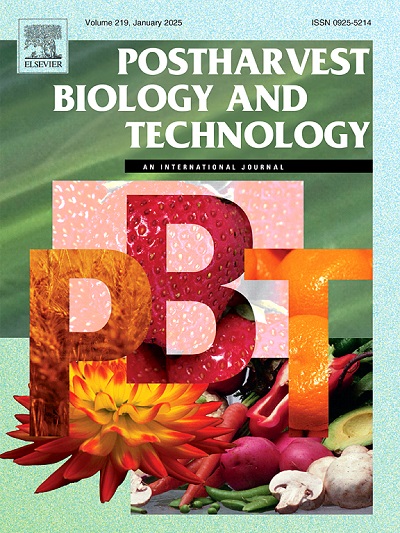Metabolomic profiling unveils metabolites that are co-regulated by the tomato fruit ripening and the cold stress response
IF 6.8
1区 农林科学
Q1 AGRONOMY
引用次数: 0
Abstract
The relationship between fruit maturity and cold resistance has been established. Nevertheless, the differentially accumulated metabolites (DAMs) in fruit of different maturities under different temperature conditions have not been thoroughly investigated. In this study, DAMs in fruit of different maturities under different temperature conditions mainly consisted of phenols, alkaloids, flavonoids, and nucleic acids and their derivatives. Compared with the DAMs produced during natural ripening, the post-ripening and senescence processes were found to give rise to additional phenylpropanoid substances. Moreover, among the DAMs co-upregulated during natural ripening, post-ripening, and senescence, one alkaloid (caffeine) and two flavonoids (2,3-dihydro-2-phenyl-4H-benzopyran-4-one, cyanoglucose-3-rutinoside) were identified. For mature-green fruits, the DAMs induced by low temperature were mainly enriched in nucleotide metabolism, plant hormone signal transduction, galactose metabolism, and flavone and flavonol biosynthesis pathways. Regarding ripening red fruit, the DAMs induced by low temperature were predominantly enriched in nucleotide metabolism, phenylpropanoid biosynthesis, galactose metabolism, and flavonoid biosynthesis. Notably, 1-Caffeoylquinic acid showed an up-regulation pattern in both mature-green and ripening red fruit under the influence of low temperature, while caffeine was down-regulated at both stages. Intriguingly, regardless of whether the fruit were at the mature-green stage or the ripening red stage, the low-temperature induced up-regulation of metabolites did not overlap with room-temperature induced up-regulation of metabolites. However, low-temperature induced up-regulation of metabolites intersected with the metabolites down-regulated under normal temperature, suggesting a complex and potentially antagonistic regulatory relationship between the normal and low-temperature metabolic responses in tomato fruit. These results indicate that 1-Caffeoylquinic acid and Caffeine may be key metabolites involved in fruit ripening, aging, and response to low-temperature stress.
代谢组学分析揭示了受番茄果实成熟和冷胁迫反应共同调节的代谢物
建立了果实成熟度与抗寒性的关系。然而,不同成熟度果实在不同温度条件下的代谢物差异积累(DAMs)尚未得到充分的研究。在本研究中,不同成熟度、不同温度条件下果实中的dam主要由酚类、生物碱、类黄酮和核酸及其衍生物组成。与自然成熟相比,成熟后和衰老过程中产生了额外的苯丙类物质。此外,在自然成熟、成熟后和衰老过程中共同上调的dam中,鉴定出一种生物碱(咖啡因)和两种黄酮类化合物(2,3-二氢-2-苯基- 4h -苯并吡喃-4- 1,氰葡萄糖-3-芦丁苷)。对于成熟的青果,低温诱导的坝主要富集在核苷酸代谢、植物激素信号转导、半乳糖代谢以及黄酮和黄酮醇生物合成途径上。在红果成熟过程中,低温诱导的大坝主要富集于核苷酸代谢、苯丙类生物合成、半乳糖代谢和类黄酮生物合成。值得注意的是,在低温的影响下,1-咖啡酰奎宁酸在成熟绿果和成熟红果中均呈上调趋势,而咖啡因在这两个阶段均呈下调趋势。有趣的是,无论果实处于熟绿期还是熟红期,低温诱导的代谢物上调与室温诱导的代谢物上调没有重叠。然而,低温诱导的代谢物上调与常温下下调的代谢物交叉,表明番茄果实正常和低温代谢反应之间存在复杂的、潜在的拮抗调节关系。这些结果表明,1-咖啡酰奎宁酸和咖啡因可能是参与果实成熟、老化和低温胁迫反应的关键代谢物。
本文章由计算机程序翻译,如有差异,请以英文原文为准。
求助全文
约1分钟内获得全文
求助全文
来源期刊

Postharvest Biology and Technology
农林科学-农艺学
CiteScore
12.00
自引率
11.40%
发文量
309
审稿时长
38 days
期刊介绍:
The journal is devoted exclusively to the publication of original papers, review articles and frontiers articles on biological and technological postharvest research. This includes the areas of postharvest storage, treatments and underpinning mechanisms, quality evaluation, packaging, handling and distribution of fresh horticultural crops including fruit, vegetables, flowers and nuts, but excluding grains, seeds and forages.
Papers reporting novel insights from fundamental and interdisciplinary research will be particularly encouraged. These disciplines include systems biology, bioinformatics, entomology, plant physiology, plant pathology, (bio)chemistry, engineering, modelling, and technologies for nondestructive testing.
Manuscripts on fresh food crops that will be further processed after postharvest storage, or on food processes beyond refrigeration, packaging and minimal processing will not be considered.
 求助内容:
求助内容: 应助结果提醒方式:
应助结果提醒方式:


